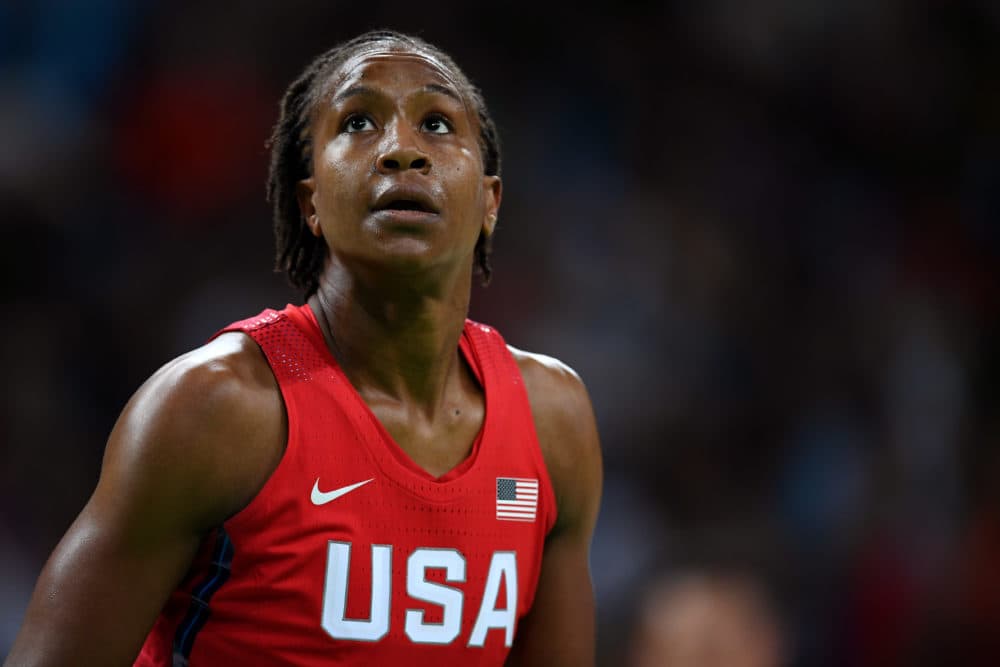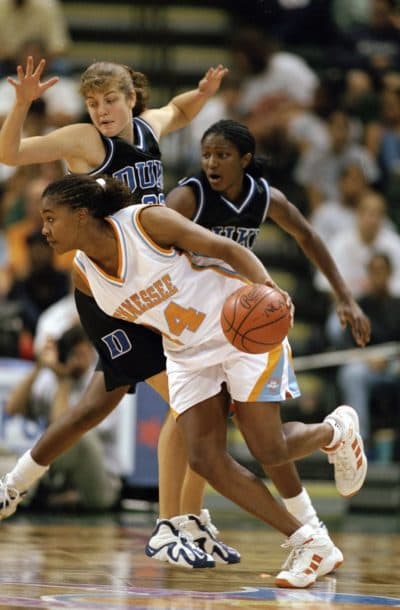Advertisement
How Tamika Catchings Learned To Embrace Her Hearing Impairment
Resume
Tamika Catchings is one of the greatest WNBA players of all time. She’s been a champion and an MVP. And she’s won a league-record five Defensive Player of the Year Awards.
But success didn't always come easy.
When Catchings was 3 years old, she was at a playground with her family. That’s when her parents found out she had a problem.
"My dad was behind me, and he was calling out my name," Catchings recalls. "And, finally, after calling out my name a couple of times, he basically saw me, just like — I wasn't moving. I wasn't — I had no recognition that he was even talking to me."
A few years earlier, Catchings' older brother had been diagnosed with a hearing disability. So her parents knew the signs.
"And so right after that day on the playground, my mom and dad took me to get my hearing tested," Catchings says. "And we found out that, just like my older brother, I was born with a hearing disability."
Soon, Catchings got her first hearing aids. She describes them as big, clunky, brown boxes.
'Today Is Gonna Be A Good Day'
Catchings' dad, Harvey Catchings, played 11 seasons in the NBA. Because of that, growing up, Catchings' family moved around a lot. When Harvey’s basketball career was over, Catchings was in second grade.
"We moved down to Abilene, Texas, and the kids just didn't get it," Catchings says. "You know, I talked different. I didn't have the southern slang like they had. But then, also, like, I had a lisp. And I had to wear hearing aids, and, you know, I was tall, too, so that didn't help."
"Just the constant nagging, and the constant getting made fun of and just being different — that was tough," she adds. "In second grade, you can only imagine when you're just trying to fit in, like, that’s not what you wanna hear. And that's not what you want to get made fun of for."
Then, in third grade...
"I remember just waking up one day, and I was like, 'OK. Today is gonna be a good day,' " Catchings recalls.
Walking to school with her older siblings, Catchings repeated those words — "Today is gonna be a good day" — over and over again.
"But literally, as soon as I walked through the doors, I got made fun of," Catchings says. "And I just remember trying to be as invisible as I possibly could be, even though I was taller than everybody, and just trying to blend in. And, no matter what I tried to do, I couldn't blend in."
Learning To Live Without Hearing Aids
"On my way home from school, my brother, my sister were in front of me as we were walking past a tall field of grass," Catchings says. "I just remember stopping. And I took one hearing aid out. Then I took the other hearing aid out, turned to the field and just threw ‘em as far as I could.
"When my mom finally realized that I didn't have my hearing aids, we went and started trying to look for 'em. Of course, we couldn't find 'em. So, I remember her sitting me down and just saying, you know, 'Your father and I cannot afford to buy you new hearing aids. You're gonna have to learn how to live without 'em.' "
"I took the ... hearing aid[s] out, turned to the field and just threw ‘em as far as I could."
Tamika Catchings
So, Catchings did just that. She learned to read lips, sat in the front row and studied her textbooks before class. And afterwards, she always talked to her teachers, because...
"I would have words then blank, and words then blank — because every time the teacher would turn to write on the chalkboard I didn't know what they were saying. And so the teachers would have to fill in the blanks," Catchings says.
Catchings' hard work paid off in the classroom. That year, she also started playing organized basketball. Catchings says that, on the court, her hearing impairment didn’t feel like an issue. She says most of the communication happens through body language anyway.
Still, Catchings says that year was one of the hardest of her life.
"Because that was the first time that I realized how different I was than everybody else," she says. "I would try to guess what people are saying, instead of really knowing and understanding. You kind of put yourself in a position where you’re already at a loss. Especially in rooms where there’s a lot of people, it was even harder to stay engaged in conversations.
"And so I started to shy away from wanting to be in big groups, wanting to be in those situations where I would feel that I couldn't hear or I couldn't understand. And so that’s kind of — around that point, really, where I lost my voice. So it was really hard for me to really have my own group of friends. Thank God for my brother and my sister. They literally took me under their arms, and just — my sister, wherever she went, I went."
But, when Catchings was in sixth grade, her parents broke the news that they’d be getting a divorce. Before her junior year in high school, Catchings and her mom moved to Duncanville, Texas without her siblings and her dad.
Catchings had to learn to speak for herself. It helped that, by this time, Catchings had become a star on the basketball court. She no longer stood out because she was different. She stood out because she was good — good enough to get an offer from her dream school: the University of Tennessee.

A Meeting With Pat Summitt
A few weeks into Catchings' freshman season at Tennessee, head coach Pat Summitt asked to meet her in the training room after practice.
"You can imagine just like anybody, any kid that thinks they're about to get in trouble, I was, like, racking my brain: 'What did I do wrong? What did I say? What happened? I've been going to my classes. I think I’ve been getting good grades,' " Catchings recalls. "So I can see myself walking to the training room as slowly as possible, trying to figure out in my head what this conversation could be about."
Summitt was waiting with the team’s athletic trainer.
"So I get in there and sit down. And, you know, Pat just starts talking about just how proud she is of me, and, you know, just having me as part of the team was just great, and I’m working so hard, and, like, she just went through all this stuff," Catchings recalls. "And I’m like, 'OK. This is good. This is good. All right.'
"And then she gets to a point where she was like, 'You know, when people can't see, what do they need?' And I was like, 'Well, they need glasses. They gotta be able to see, so get some glasses, get contacts.' I wear both, so not ashamed for either one of them. And then, you know, she asked, 'Well, like, when people walk with a limp or, you know, need a little bit of assistance, what do they need?'
"So we went through a series of questions. And the last question that she asked was, 'When people can’t hear, what do they need?' And I remember — I almost hit myself on the head, like, 'How did I get set up in this conversation?' But I was like, 'Yeah, I mean, they need hearing aids.' "
Impacting 'Thousands, Maybe Millions'
"Through the few weeks that I was there, there must have been a couple of times where I didn't fully hear some of the things that she had delivered," Catchings says. "And so she kind of started, like, keeping up with that. And so Pat just said — she said, 'You know what? One day your story will impact thousands, maybe millions of people. I suggest that you get back into wearing your hearing aids. We can get back into speech therapy. That can help you.'
"And she's like, 'I want to help you be the best version of yourself.' "
So, before the 1997-98 season began, Catchings started wearing her hearing aids again — for the first time since third grade.
As a freshman, Catchings averaged 18.2 points and 8 rebounds and helped Tennessee win the national championship. And while she was in the WNBA, she started using her celebrity to talk about her experiences with hearing impairment.
Here’s Catchings during a TED Talk she gave last year:
"If you could go back and talk to the little girl who threw away her hearing aids, what would you say?" I ask.
"I'd say, 'Everything’s gonna be OK,' " Catchings answers. " 'This is what you're going through now. But, one day, you'll look back, and this will just be a part of your story. You will one day impact thousands, maybe millions of people.'
"People ask all the time: 'If you could change one thing about your life, what would you change?' And, honestly, I am the person that I am today because of everything that I went through, so I wouldn’t change anything.' "
This segment aired on January 4, 2020.

